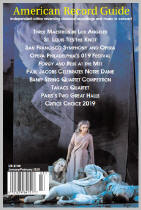Texte paru dans: / Appeared in: |
|
|
Outil de traduction ~ (Très approximatif) |
|
|
Reviewer: Catherine
Moore
The title uses “anamorphosis”,
a term from visual art (yes, I had to look it up), to draw attention to the
baroque musical practice— and artifice—of improvisatory performance and
transformational re-composition. For example, original texts are replaced by
others so that Monteverdi’s rousing madrigal ‘Altri Canti Di Marte’ (from
Book 8) becomes the Easter celebration ‘Pascha Concelebranda’; and Luigi
Rossi’s ‘Un Ferito Cavalier’ lament for Queen Christina of Sweden on the
death of her husband becomes ‘Un Allato Messagier’, Mary Magdalene’s lament
on the death of Christ. In the latter case, the re-composer is not known; in
the former it was German composer, theorist, and editor Ambrosius Profe
(1589-1661). Often, as with these two examples, the music changes very
little, but the text tells a sacred story instead of a secular one. Mary
Magdalene’s grief is by turns prayerful, forlorn, vengeful, and silent. In
the better known pieces here, such as ‘Altri Canti Di Marte’ and the Allegri
‘Miserere’, the listener will find pleasure in the aural equivalent of
déja vu. The performances are very fine, with 9 singers and 8
instrumentalists in many different combinations. The gentle dark growling of
harp and violone opens ‘Un Allato Messagier’; a suave cornett melody sets
the scene in Monteverdi’s ‘Si Dolce E ‘L Martire’; and all 9 singers
(unaccompanied) bring an eager gladness to their acknowledgement of sin and
prayer for mercy in Allegri’s ‘Miserere’. Strong chromaticism depicts a
groaning heart in ‘Domine, Ne In Furore Tuo’ (anonymous), and two
characters—Vita and Piacere—contemplate innocence and happiness in the grand
passacaglia duet from Marazzoli’s ‘Chi Fa Che Ritorni’. John Barker called
the same ensemble’s performance of Delalande motets “exemplary” (Alpha 968,
S/O 2018) and I liked both their Monteverdi and Marazzoli program (Alpha
306, M/A 2016) and Florence 1616” (Alpha 321, M/A 2017: 225). In both those
reviews I complained about the lack of texts. But here we have texts and
translations. | |
|
|
|
|
Cliquez l'un ou l'autre
bouton pour découvrir bien d'autres critiques de CD |
|




